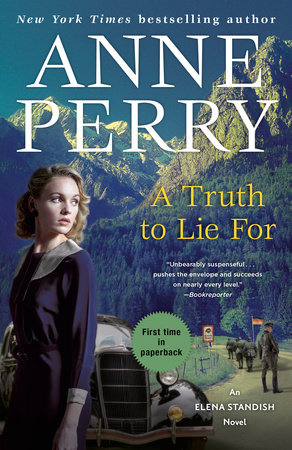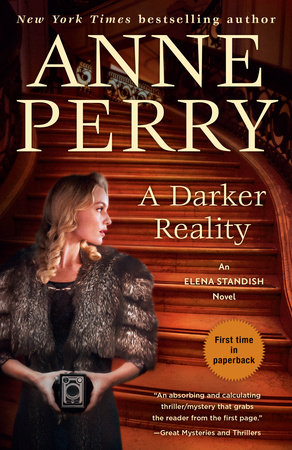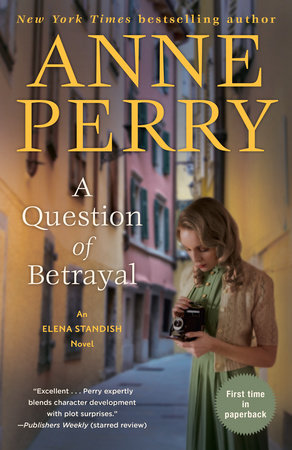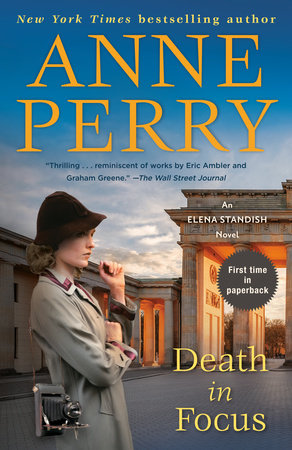Excerpt
The Traitor Among Us
Chapter 1 Lucas Standish was not asleep in his chair—not quite. The September sunlight lay in a soft, bright pool on the floor, picking out the colors of the carpet and the patches worn by the passage of feet over the years. He could still hear the soft chattering of the birds from the garden. When the telephone rang, its shrill noise startled him fully awake. It must be important for anyone to call at this time on a Sunday afternoon.
He reached for the phone and said quietly, “Standish.”
“Sorry,” the voice at the other end replied.
Lucas recognized it, even from that one word. It was James Allenby, back in England after two years in the United States. He did not bother to say that it was urgent. Of course it was. He would not call Lucas for anything less.
“What is it?” Lucas did not waste time with trivia.
“I’m afraid it’s bad.”
Lucas knew Allenby well enough to recognize how the man’s carefully controlled voice betrayed the depth of his emotion.
“John Repton is dead,” Allenby told him. “Shot and left in a ditch in the countryside. In the Cotswolds, near a private estate called Wyndham Hall. Single rifle bullet to the heart. I think he was killed somewhere else, and then moved. Not enough blood on the ground where he was discovered. Not visible from the road. In fact, it was only by chance that he was found at all.”
Lucas felt a sudden intense pain of loss. He had known John Repton for years. They had worked together in MI6 during the Great War, which had spread ruin across half the world, from the late summer of 1914 to November of 1918. That had been sixteen years ago. Now, in the waning summer of 1934, the prospect of conflict was returning. Less than three months ago, Adolf Hitler had silenced, banished, or executed thousands of his most dangerous enemies within his own country. Those who had survived were forced to live in mute obedience. The events, which had come to be known as the Night of the Long Knives, were still fresh in Lucas’s memory.
“What was he working on?” Lucas asked. “I thought John was retired.”
“There’s always the one last time. And he was passionate about this particular project,” Allenby replied. “You understand.”
Allenby was referring to the fact that Lucas had more or less retired. He was well over the age when most men sat back and relaxed, taking up gardening or beginning that book they had always intended to write. But Lucas could not leave the job alone: He cared too much; it involved every part of his life. He had been willing to be called on by those who had previously worked for him, and eventually he returned as an adviser and, sometimes, more than that. He had a good idea that John Repton had been doing something similar.
“John was looking into personal influence,” Allenby continued. “That is, people who were using their influence to back some candidates for Parliament and ruin the reputations of others. There’s a lot of sympathy for Germany, and admiration for the way it is rising to power again. So many think the Treaty of Versailles was a recipe for future disaster, punitive beyond sense, and—”
Lucas interrupted him. “We know all that, James. But it’s too late to undo, even if we could. What can we do now? Germany is rebuilding at a hell of a pace and beginning to prosper. Specifically, what was Repton looking into that got him killed? Are you absolutely sure it wasn’t personal, or even accidental?” He knew that Allenby had more sense than to have jumped to a conclusion without proof. Still, he had to ask.
There was a moment’s hesitation before Allenby spoke again, his voice completely unchanged. “He was sixty-two and lived alone, so the chances of it being personal exist, but they are unlikely. Repton had no close personal relationships. Most of his family are dead; there are a few living abroad. He has a house, inherited from his parents, in Lincolnshire, miles from the Cotswolds or Wyndham Hall.”
“Have you been there?” Lucas pressed. “That is, to his home.”
“Only once, briefly,” Allenby answered. “I’ve had no time to research what I might be looking for; it’s too soon. But I wanted to see if Repton left any kind of note, or evidence.”
“And did you find anything useful?”
“Lots of newspapers.”
“Specifically, which ones? Did he cut anything out, or mark anything? Dates?”
“It was just one whole cupboard of newspapers. A lot of them Bagby’s titles.”
Bagby was a newspaper magnate at both ends of the popularity scale. He published the exploits, relationships, and personal griefs of the social elite. The readership was small when compared to the millions who bought his other newspaper, in which the gossip and scandal often descended to the level of the gutter. At a glance, that paper featured the complaints and aspirations of the working man, and gave a loud and eloquent voice to the injustices of society and the anger that they rightly caused. It took a fairly critical eye to see how much it followed and how much it led mass opinion.
“Curiosity?” Lucas wondered aloud. “Or was John following something in particular?”
“If there was something in particular, I didn’t see it.” There was a catch in Allenby’s voice, as if he knew he had missed something. “He marked some of the letters to
The Times, even though they seem on the surface to be little more than a diary of gentlemen’s parties, sports, messages, and advice on the stock exchange. And, of course, the bit of scurrilous gossip that everybody despises, but still reads avidly.”
“He wouldn’t select any piece without reason.” Lucas knew for certain. “Or keep them at all, for that matter. And don’t tell me it was to light a hundred winter fires.”
He was snapping at Allenby only because the man was being careful, perhaps too careful, just as Lucas would have been. John Repton’s death hurt. He had been a good man, careful and quiet; he loved cider and creamy Lancashire cheeses and, above all, a good joke. He was gifted at telling shaggy dog stories, long and meandering, but always with a great laugh booming at the very end. He probably had no idea what a hole he would leave behind, what a sense of loss.
Allenby hesitated for a few moments before answering. Was he hiding his own grief as well? “There were several articles about Robert Hastings, the member of Parliament for the area around Wyndham Hall. Highly respected. There is even talk of him as a possible prime minister in the near future. He has the courage to face a battle, if there is one, without backing down. Next best thing to Churchill coming back from the wilderness,” he told him. “And articles about the sermons of Bishop Lamb, who’s also from around that area. Looks harmless enough, all about forgiveness and peace in our time. But then his comments would be, wouldn’t they? Coming from a bishop.” That was not really a question.
Possibilities ran through Lucas’s mind, raised by what Allenby had shared. The war was the most horrific in the history of the world. Hardly anyone was left untouched by it. No sane person wanted that again— ever.
Lucas pushed these thoughts away. This was about John Repton, a man who had been easy to see but not really noticed. He’d dressed casually. He could have passed for a law clerk or the owner of a small business, except for his shoes. His shoes had always looked well made and expensive. It turned out they had been personally made for him because his feet were slightly different sizes. He had mentioned to Lucas once that his only regret was that his job made it impossible to have a dog since he was away too often. Lucas remembered how he had stopped and spoken to other people’s dogs in the street with such joy.
And now he had discovered something that got him not only shot dead, but left in a ditch for no one to find.
“Lucas,” Allenby interrupted his thoughts. “Are you still—”
“I’m here, and I understand,” Lucas cut him off. “That’s part of what MI6 is for—to stop a plot before it is fully grown and it is too late.” Lucas paused for a moment, and then asked, “Why are you telling me this? You don’t report to me. In fact, we haven’t even spoken since the Washington incident.”
“Because John Repton was your friend. And because you have the courage to think the inconceivable,” Allenby answered. “And, if necessary, to deal with it. I know you don’t want war any more than the rest of us, but I also know that you will do what you can to prevent it by facing the possibility. And you may have friends in the aristocracy, but you have no illusions about them.”








